The SSD Relapse: Understanding and Choosing the Best SSD
by Anand Lal Shimpi on August 30, 2009 12:00 AM EST- Posted in
- Storage
All Indilinx Drives Are Built Alike
G.Skill, OCZ, Super Talent and Patriot all sent their Indilinx MLC drives in for review. If you take the drives apart you see that most are the very same on the inside, despite differences externally:
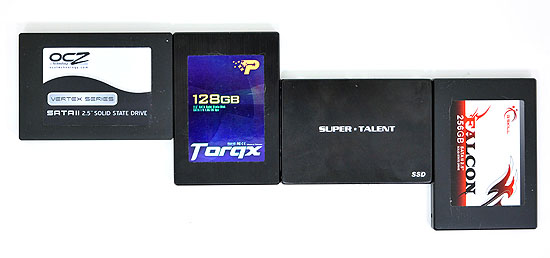
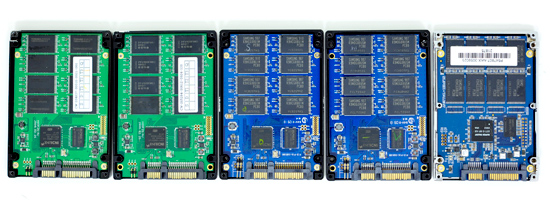
From Left to Right: OCZ Vertex Turbo, OCZ Agility, Patriot Torqx, G.Skill Falcon and Super Talent UltraDrive GX. Only the Super Talent drive uses a different PCB design.
Even the packaging doesn’t appear to vary much between manufacturers; that part I don’t really understand. All that seems to change is the artwork on the outside.
There are some minor differences between drives. Patriot ships its Torqx with a 2.5” to 3.5” drive bay adapter, a nice addition. The Torqx also comes with a 10 year warranty, the longest of any Indilinx based manufacturer. OCZ is next with a 3 year warranty, followed by Super Talent and G.Skill at 2 years.
Indilinx is still a very small company so it relies on its customers to help with validation, testing and even provide feedback for firmware development. As far as I can tell, every single Indilinx customer gets the same firmware revisions. Some vendors choose to rename the firmware revisions, while others do not. OCZ calls its latest stable firmware 1.30, while G.Skill, Super Talent and Patriot call it 1571.
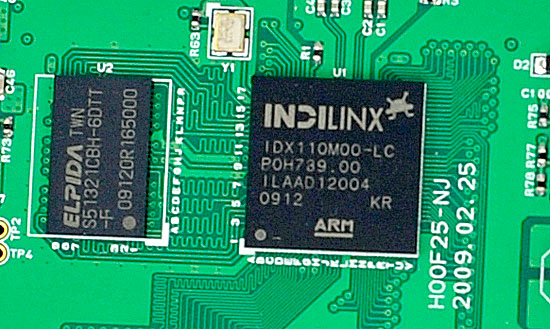
The Indilinx Barefoot controller (right), powered by an ARM core.
Of all the Indilinxites, OCZ and Super Talent work closest with the controller manufacturer. In exchange for their help in manufacturing and validation, OCZ and Super Talent also get access to the latest firmwares earlier than the rest of the manufacturers. Ultimately all manufacturers will get access to the same firmware, it just takes longer if you’re not OCZ or Super Talent.
You no longer need to use a jumper to upgrade your firmware, provided that you’re already running fw revision 1275 or later. If you have a previous version you’re pretty much out of luck as you need to upgrade to 1275 first before upgrading to anything else, and none of the manufacturers make it easy to do. Some don’t even offer links to the necessary firmware you’d need to jump to 1275. Thankfully pretty much anything you buy today should come nearly up to date, so this mostly impacts the original customers of the drive.
Performance, as you’d expect, is the same regardless of manufacturer:
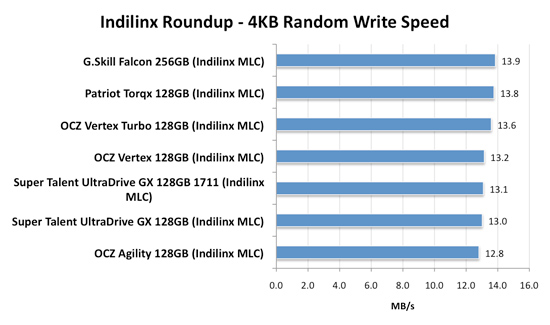
There's normal variance between drives depending on the flash/controller, that's why the OCZ Vertex is slower than the Patriot Torqx here but faster than the Super Talent UltraDrive GX. The manufacturer and size of the flash has more to do with determining performance. Samsung is used on all of these drives but the larger the drive, the better the performance. The 256GB model here will always be faster than a 128GB drive, which will always be faster than a 64GB, etc...
All of the drives here use the same firmware (1571) except for one of the Super Talent drives. That drive is using the beta 1711 firmware with TRIM support that was pulled.
When it comes to the best overall package, I’d say Patriot’s Torqx is the nicest for a desktop customer. You get a 3.5” adapter bracket and a 10 year warranty (although it’s difficult to predict what Patriot’s replacement strategy will be in 10 years).
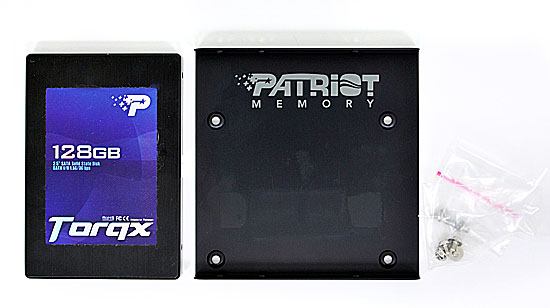
The Patriot Torqx bundle, complete with a 2.5" to 3.5" adapter.
Prices vary a bit between manufacturers, although most of the more expensive drives here have a $30 rebate to bring their prices in line:
| Price for 128GB | |
| Corsair Extreme Series | $384.00 |
| OCZ Agility | $329.00 |
| OCZ Vertex | $369.00 |
| OCZ Vertex Turbo | $439.00 |
| Patriot Torqx | $354.99 |
OCZ does do some unique things that the other manufacturers don’t such as deliver an overclocked drive (Turbo) and a drive with slower flash (Agility). There’s a Mac Edition of the Vertex, unfortunately it’s no different than the regular drive - it just has a different sticker on it and a higher pricetag.










295 Comments
View All Comments
Jedi2155 - Monday, August 31, 2009 - link
Anandtech has always been known for its in-depth analysis, you're just looking for a simple review list. I much prefer these detailed articles than just hearing the list of performance and simple recommendations that most people can write if provided the proper hardware.I love how Anand always writes excellent, very well detailed articles that are still SIMPLE to understand. A number of other sites may offer some similar levels of detailed but are sometimes a bit too difficult to comprehend without a background in the same field.
KommisMar - Sunday, April 4, 2010 - link
Anand,I read your long series of articles on SSDs today, and just wanted to say thanks for writing the most informative and interesting series of tech articles I've read in years. I've been avoiding SSDs because my first experience with one was horrible. The sustained transfer rates were no better than a traditional hard drive, and the system halting for several seconds on each random write operation was too much for me to stand.
I was so sick of the SSD coverage that I was reading on other websites because none of them seemed to answer my biggest question, which was "Which SSD won't bring my system to a screeching halt every time it needs to write a little data?"
Thanks for answering that question and explaining what to look for and what to avoid. It sounds like it's a good time for me to give SSDs another shot.
jamesy - Thursday, April 22, 2010 - link
That about sums it up: disappointment. Although this was a top-caliber SSD article, like i have come to love and expect out of anand, this article didn't make my buying decision any easier as all. In fact, it might have made it more complicated.I understand Intel, Indillinx, and Sandforce are good, but there are so many drives out there, and most suck. This article was amazing by most standards but the headline should be changed: removing the "Choosing the Best SSD."
Maybe "Choosing the right controller before sorting through a hundred drives" would be an appropriate replacement.
Do i still go with the intel 160 X-25m G2?
Do I get the addon Sata 6g card and get the C300?
Do i save the money, and get an indillinx drive? Is the extra money worth the Intel/C300 drive?
These are the main questions enthusiasts have, and while this article contained a great overview of the market in Q3 2009, SSD Tech has progressed dramatically. Only now, i think, are we getting to the point that we could publish a buying guide and have it last a few months.
I trust Anandtech, i just wish they would flat-out make a buying guide, assign points in different categories (points for sequential read/write, points for random read/write, points for real-life performance or perceived performance, points for reliability, and points for price.). Take all of these points, add em up, and make a table pls.
A few graphs can help, but the 200 included in each article is overwhelming, and does nothing to de-complicate or make me confindent in my purchase.
It's great to know how drives score, how they perform. But it's even important to know that you bought the right drive.
mudslinger - Monday, June 28, 2010 - link
This article is dated 8/30/2009!!!!It’s ancient history
Since then newer, faster SSD’s have been introduced to the market.
And their firmware have all been updated to address known past issues.
This article is completely irrelevant and should be taken down or updated.
I’m constantly amazed at how old trash info is left lingering about the web for search engines like Google to find. Just because Google lists an article doesn’t make it legit.
cklein - Monday, July 12, 2010 - link
Actually I am trying to find a reason to use SSD.1. Server Environment
No matter it's a webserver or a SQL server, I don't see a way we can use SSD. My SERVER comes with plenty of RAM 32G or 64G. The OS/start a little bit slow, but it's OK, since it never stop after it's started. And everything is loaded into RAM, no page file usage is needed. So, really why do we need SSD here to boost the OS start time or application start time?
For SQL server database, that's even worse. Let's say I have a 10GB SQL server database, and it grows to 50GB after a year. Can you image how many random writes, updates between the process? I am not quite sure this will wear off the SSD really quick.
2. For desktop / laptop, I can probably say, install the OS and applications on SSD, and leave everything on other drives? And even create page file on other drives? As I feel SSD is only good for readonly access. For frequent write, it may wear off pretty quick? I am doing development, I am not even sure I should save source code on SSD, as it compiles, builds, I am sure it writes a lot to SSD.
So over all, I don't see it fits in Server environment, but for desktop/laptop, maybe? even so, it's limited?
someone correct me if I am wrong?
TCQU - Thursday, July 29, 2010 - link
Hi peopleI'm up for getting a new Macbook pro with ssd.
BUT i heard somthing about, that the 128gb ssd, for apples machines, was made by samsung. I was ready to buy it, but now that i've heard that first of all "apples" ssd's is much slower that they others on the marked. Then i read this. So now i'm really confused.
What shoud i do?
buy apples macbook pro with 128gb ssd
or should i buy it without and replace it with an other ssd? thoughts? plzz help me out
thanks
Thomas
TCQU - Thursday, July 29, 2010 - link
Hi peopleI'm up for getting a new Macbook pro with ssd.
BUT i heard somthing about, that the 128gb ssd, for apples machines, was made by samsung. I was ready to buy it, but now that i've heard that first of all "apples" ssd's is much slower that they others on the marked. Then i read this. So now i'm really confused.
What shoud i do?
buy apples macbook pro with 128gb ssd
or should i buy it without and replace it with an other ssd? thoughts? plzz help me out
thanks
Thomas
marraco - Friday, August 13, 2010 - link
Why Sandforce controllers are ignored?I’m extremely disappointed with the compiler benchmark. Please test .NET (With lot of classes source files and dependencies). It seems like nothing speeds up compilation. No CPU, no memory, no SSD. It makes nonsense.
sylvm - Thursday, October 7, 2010 - link
I found this article of very good quality.I was looking for a similar article about express card SSDs using PCIe port, but found nothing about their performance for rewrite.
The best I found is this review http://www.pro-clockers.com/storage/192-wintec-fil... saying nothing about it.
Expresscard SSDs would allow good speed improvement/price compromise : buying a relatively small and cheap one for OS and softwares, while keeping the HDD for data.
Has anyone some info about it ?
Best regards,
Sylvain
paulgj - Saturday, October 9, 2010 - link
Well I was curious about the flash in my Agility 60GB so I opened it up and noted a different Intel part number - mine consisted of 8 x 29F64G08CAMDB chips whereas the pic above shows the 29F64G08FAMCI. I wonder what the difference is?-Paul